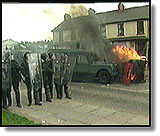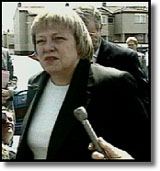
|
Doubts Over Talks On Orangemen MarchesAttempts to defuse the crisis over the coming marching season in Northern Ireland are continuing, but it looks unlikely that there will be any direct talks between leaders of the nationalist and loyalist communities soon.The Northern Ireland Secretary Mo Mowlam has met nationalist residents of Garvaghy Road in Portadown, where Drumcree Orangemen are due to march on July 6. The talks ended after 40 minutes, with no sign of any emerging agreement. The Garvaghy Road Residents Coalition announced that there would be a third meeting in the coming days. Ms Mowlam refused to speak to reporters as she emerged from the talks. Earlier she had stressed that she was determined to find some form of agreement. "We will continue to do all we can in the couple of weeks we have got left to see if we can get any kind of accommodation which is really the only way we are going to move things forward," she said. She added that the murder of two RUC officers by the IRA on Monday had spurred people to find a compromise. Garvaghy resident's spokesman Brendan McKenna said he had made it clear that Portadown's Catholics needed a "breathing space" and called on the Orange Order to talk to "ordinary nationalist people". This would be a pre-condition for any resolution to the crisis.
The statement accused Sinn Fein and the IRA of "manipulating" certain residents groups, making dialogue impossible. It said: "The responsibility rests with such a group to demonstrate that they are not being manipulated by an organisation whose clear aim is to drive Protestants out of the land and to kill them if necessary." The statement added that the Orange Order was prepared to meet with people it regarded as committed to "peace and democracy". However, such meetings would not be held to seek permission to march, but to "ascertain what the local problems are and seek to allay the fears of the community."
|
Diana, Princess of Wales, 1961-1997
Conference 97
Devolution
The Archive
News |
Issues |
Background |
Parties |
Analysis |
TV/Radio/Web
Interactive |
Forum |
Live |
About This Site
News |
Issues |
Background |
Parties |
Analysis |
TV/Radio/Web
Interactive |
Forum |
Live |
About This Site
© BBC 1997 |
politics97@bbc.co.uk |

